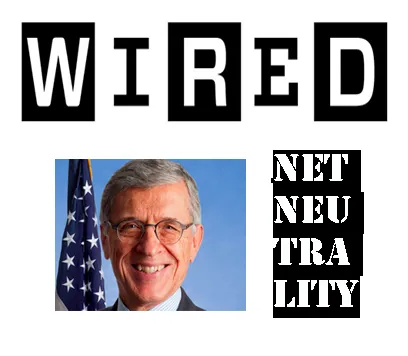Wheeler formally announces Title II drive for broadband

FCC Chairman Tom Wheeler took to an unorthodox forum to make his long-awaited Net Neutrality announcement: an op-ed in Wired Magazine.
He noted that the subject has been debated for over a decade and had received more than four million public comments. So, no one will be very surprised as he announced that this week, “I will circulate to the members of the Federal Communications Commission (FCC) proposed new rules to preserve the internet as an open platform for innovation and free expression.”
Since assuming his office in November, 2013, Wheeler has made no secret of his desire to use the FCC to codify consumer and competitive protections into law. He is relying on both precedent and experience in the communications industry. As he said, “The phone network’s openness did not happen by accident, but by FCC rule.”
To do so he is proposing to use the FCC’s Title II authority:
“Using this authority, I am submitting to my colleagues the strongest open internet protections ever proposed by the FCC. These enforceable, bright-line rules will ban paid prioritization, and the blocking and throttling of lawful content and services. I propose to fully apply – for the first time ever – those bright-line rules to mobile broadband. My proposal assures the rights of internet users to go where they want, when they want, and the rights of innovators to introduce new products without asking anyone’s permission.”
And despite criticism from portions of the telecommunications industry and from right-wing ideologues, Wheeler believes strongly that “All of this can be accomplished while encouraging investment in broadband networks.”
In an effort to make his proposal as clear as possible, the FCC released a public fact sheet on its website.
This fact sheet further details the basis of FCC Open Internet rules: Title II of the Communications Act and Section 706 of the Telecommunications Act of 1996. And then goes on to explain that he’s proposing these rules despite earlier setbacks in the courts.
Within the detail, the sheet focuses on the core of existing threats to an open Internet. And proposes what they call Bright Line Rules to prevent that from happening:
- No Blocking: broadband providers may not block access to legal content, applications, services, or non-harmful devices.
- No Throttling: broadband providers may not impair or degrade lawful Internet traffic on the basis of content, applications, services, or non-harmful devices.
- No Paid Prioritization: broadband providers may not favor some lawful Internet traffic over other lawful traffic in exchange for consideration – in other words, no “fast lanes.” This rule also bans ISPs from prioritizing content and services of their affiliates.
An avalanche of media coverage has made it clear that Wheeler faces opposition in and out of government. But the next step is just three weeks away: the full FCC will vote on the proposal at its open meeting this coming February 26.
To examine the basis and specifics of the proposal, read the FCC’s full fact sheet here.
FCC Chairman Tom Wheeler: This Is How We Will Ensure Net Neutrality (Wired, Jan. 4, 2015)
Fact Sheet: Chairman Wheeler Proposes New Rules (FCC fact sheet, Jan. 5, 2015)
CWA members oppose AT&T’s attempts to stop serving rural and low-income communities in California
CWA urges FCC to deny industry attempts to loosen pole attachment standards
CWA District 6 reaches agreement with AT&T Mobility



